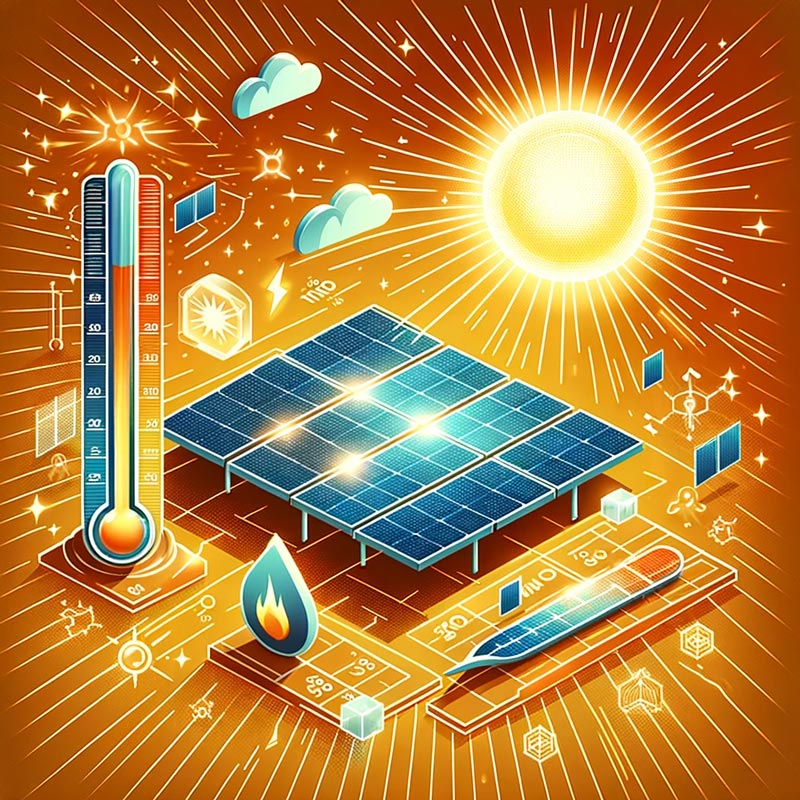
Table of Contents:
- Introduction to Solar Panel Efficiency
- The Core Principle: Light Absorption in Solar Panels
- Crucial Factors Affecting Solar Panel Efficiency
- Technological Innovations Enhancing Efficiency
- Understanding the Temperature Impact on Solar Panels Case Study: Efficiency in Varied Climates
- Debunking Myths: Heat vs. Light in Solar Efficiency
- Future Trends in Solar Panel Technology
- Conclusion
- Contact Ascent Solar and Roofing
Introduction to Solar Panel Efficiency
Solar panel efficiency is a key factor determining the effectiveness and viability of solar energy systems. This article will explore the fundamental aspects of solar panel efficiency, focusing on the significance of light absorption and the effect of temperature.
The Core Principle: Light Absorption in Solar Panels
Solar panels primarily function through the absorption of light, not heat. The photovoltaic cells within the panels convert sunlight into electricity through the photovoltaic effect. Studies by the National Renewable Energy Laboratory (NREL) have shown that light intensity significantly influences solar panel output.
Crucial Factors Affecting Solar Panel Efficiency
Several factors impact solar panel efficiency, including the type of photovoltaic cell, panel orientation, shading, and ambient temperature. Each of these plays a role in how effectively a solar panel can convert sunlight into electrical energy.
Technological Innovations Enhancing Efficiency
Advancements in solar technology, such as PERC cells and multi-junction solar cells, have dramatically improved efficiency. Research from the Institute of Electrical and Electronics Engineers (IEEE) illustrates how these technologies enhance light absorption and energy conversion rates.
Understanding the Temperature Impact on Solar Panels
Contrary to common belief, higher temperatures can reduce solar panel efficiency. The temperature coefficient, a parameter detailed in solar panel specifications, indicates performance changes in response to temperature variations. Case studies from regions with high ambient temperatures have shown a decrease in efficiency during peak heat periods.
Case Study: Efficiency in Varied Climates
A notable example is a study conducted in Arizona, a region known for its high temperatures. The research, published in the "Journal of Renewable and Sustainable Energy," demonstrated that solar panels in Arizona suffered efficiency losses during the hottest months, emphasizing the importance of temperature management in solar installations.
Debunking Myths: Heat vs. Light in Solar Efficiency
There are several misconceptions regarding the impact of heat on solar panels. This section aims to clarify these myths by presenting factual information based on scientific research, ensuring a correct understanding of what influences solar panel efficiency.
Future Trends in Solar Panel Technology
The future of solar panel technology points towards increased efficiency and adaptability. Emerging trends include the development of panels with better temperature tolerance and the integration of solar into various materials, as reported by the International Energy Agency (IEA).
Conclusion
Solar panel efficiency hinges more on light absorption than heat. Recognizing the factors that affect efficiency is crucial for optimizing solar energy systems and making informed decisions about solar panel installations.
Contact Ascent Solar and Roofing
Ascent Solar and Roofing is committed to providing the latest and most efficient solar technology solutions. If you're considering solar panels for your home or business and want to understand how to optimize efficiency, our team is here to help. We offer expertise in selecting the right panels for your specific environment and ensuring they perform at their best. Contact us for personalized advice and to explore our range of efficient solar solutions.


